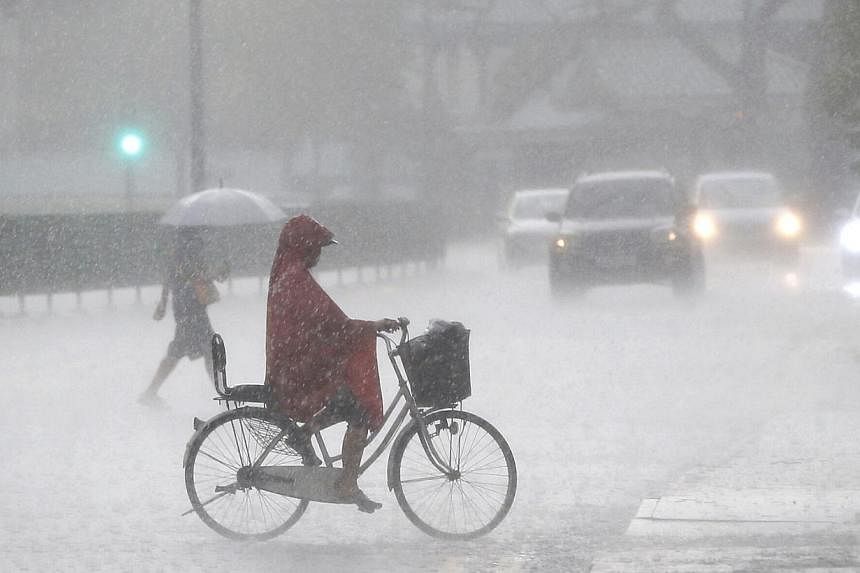Singapore is consistently hot and sticky. But other aspects of our weather are, it seems, being turned upside-down.
Last February, the official weather station of record at Changi Airport measured a minuscule 0.2mm of rainfall, a monthly total that broke records for Singapore. This dry spell persisted until the middle of March.
On the other side of the rainfall coin, intense thunderstorm events seem to be becoming more frequent, on some occasions leading to flash flooding. In addition, over the past two years, we've experienced several prolonged haze episodes that have exceeded hazardous PSI levels, including one that topped 400 on the three-hour PSI on June 20 last year. This year, there have also been periods when the PSI has been in the "unhealthy" range.
Such unusual weather incidents are not unique to Singapore. There were extreme snowstorms in North America in November; devastating storm surges in the Philippines from superstorms Haiyan and Glenda over the past two Pacific typhoon seasons; and crippling drought that has afflicted many parts of Australia over the past few years.
Climatologists call these incidents "extreme events", defined as weather episodes that exceed a given threshold. This threshold is usually taken to be an event that is most unusual by a ratio of one in 10 on the basis of a location's weather history.
Important distinction
THIS, of course, begs a question: Is the increasing frequency of these extreme or weird weather events in Singapore and elsewhere due to chance, or to climate change? Unfortunately the answer is not a straightforward "yes" or "no", and requires a nuanced explanation.
There is an important distinction between short-term weather that we experience daily and the long-term climate of Singapore. The former, characterised by day-to-day changes in atmospheric properties like temperature and rainfall, is greatly influenced by numerous factors, from local variations in Singapore's land cover, to the simultaneous presence of other weather phenomena occurring hundreds of kilometres away.
For instance, summer typhoons off the eastern Philippine archipelago often alter surface wind direction in Singapore, and increase the likelihood of early-morning thunderstorms here during the south-west monsoon. It is the multitude of intersecting and highly variable factors for a single weather event which makes short-term weather forecasting - even with ever-faster supercomputers - such a challenging endeavour.
The study of climatology, however, involves appreciating that the atmosphere is part of a large and mostly stable earth system with inputs, outputs and feedback. Longer-term records of climate data, typically over 30 years, combined with accurate numerical climate models allow us to examine how changes to boundary conditions of the climate system - instead of internal variations associated with weather - affect a location's climate.
This subtle distinction is important. While we may have difficulty forecasting if it will rain over Changi Airport a week from today, our knowledge of the longer-term climatology of Singapore allows us to forecast - with a high degree of confidence - that there will be more rain in Singapore during December than in June.
We also know with an equally high degree of confidence that the effect of higher concentrations of greenhouse gases results in more energy being added into the global climate system, which, as rudimentary physics tells us, results in a warmer and wetter atmosphere. Basic statistics and probability theory then inform us that a small change in the average heat and moisture conditions would lead to significant changes in the distribution of weather extremes worldwide.
A useful traffic analogy
IMAGINE you drive to work by taking the Pan-Island Expressway. In the course of your numerous trips, you witness vehicle breakdowns and accidents that occur daily along the way, which sometimes can occur to your vehicle due to random bad luck.
Now, say you increase your commute's average speed by 1kmh every week. Inevitably, when your speed is high enough you will be involved in an accident. It could be due to your own actions - such as a slower reaction time to brake - or from events beyond your control, such as an oil slick or a careless driver. Thus, the probability of an incident occurring would increase the faster you go, but the major cause of your inevitable accident would still depend on your circumstances.
When considering this analogy, first used by the US National Centre for Atmospheric Research, one can see how difficult it is to pin down an extreme weather event as being caused by climate change. That said, there is a branch of climate research - known as attribution science - which combines a deep understanding of both climate physics and statistical analysis from local observational data, that attempts to do just this.
While the field is still in its infancy, recent studies of global extreme weather events published by the American Meteorological Society show that an increasing number of these incidents do have a discernible climate change signal. That is, the odds favouring weird weather have been very likely shifted due to the greater warmth within the earth system.
So, back to the question posed earlier: Is climate change to blame? Perhaps the most fitting answer comes from the noted atmospheric scientist Kevin Trenberth.
He said: "…in reality, the wrong question is being asked: The question is poorly posed and has no satisfactory answer. The answer is that all weather events are affected by climate change because the environment in which they occur is warmer and moister than it used to be."
The writer is an Assistant Professor at the Department of Geography, National University of Singapore.

